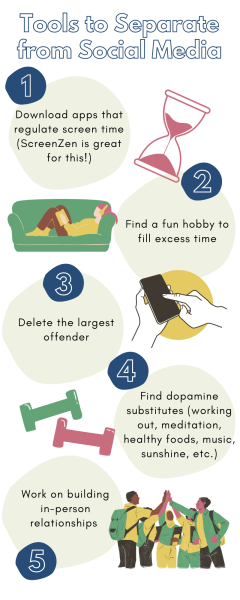Social media connects our society. Every hour of every day is spent checking notifications, snapping pictures and scrolling through funny videos. Apps like TikTok, Snapchat and Instagram allow us to build relationships and gather useful information to aid our lives; however, to what extent of social media use do these positive effects dissipate in favor of escalating anxiety, self-hate and an obsessive drive to prove that you are as significant and interesting as the people you see on the other side of the screen?
Teenagers are extremely susceptible to peer pressure that conforms to societal expectations. When those expectations are set through social media apps, adolescents develop a warped sense of the world full of fast-fashion consumption, devastating diets, cyberbullying and unsustainable lifestyles all due to a fear of missing out.
“Our brain, at the most basic level, is primed to be included and comply with social norms; we all want to be included to a certain extent. Social media can amplify this feeling as we cannot escape its messages,” Omilion-Sugg said.
Social media is a drug for our brains, serving a dopamine release similar to that of alcohol and cocaine. Dopamine is a neurotransmitter responsible for pleasure, learning and motivation. Social stimuli such as receiving likes on a post, watching an amusing video or opening a kind message release dopamine, activating the brain’s reward center. Furthermore, apps like TikTok champion other dopamine-releasing activities like listening to music or working out by having a fast, effective release. This efficiency keeps consumers coming back to social media in increasingly large doses.
Similar to substance abuse, quitting social media is extremely challenging because of dopamine withdrawal. The craving to unlock the device often overpowers self-restraint as the brain screams for more pleasure; more mindless scrolling. Because of this, quitting social media takes mountains of discipline and self-restraint. It is hard work, but it is possible.
“If we fail to disconnect from social media this can impact our stress levels, mood, and sleep schedule just to name a few,” Omilion-Sugg said.
The greatest offender in terms of developing addictive characteristics is TikTok. Studies show TikTok is linked to memory damage and decreased attention span. In our survey, 34 percent of high school students said TikTok is their most used app. These hours spent scrolling fast-paced videos damage cognitive abilities and lead to personal comparison with influencers showing unachievable lifestyles.

“I quit TikTok because I felt like every time I was on the app I was just constantly finding ways to compare myself to others,” senior Isabelle Queen said. “Quitting TikTok made me more confident in myself and allowed me to create more purposeful experiences with my friends and family.”
Similar to Isabelle, I have also undergone a social media detox over the past six months. By deleting TikTok and limiting time spent on other social media, I have decreased my average screen time from four hours a day to only one hour. Instead of getting sucked into the addictive portal of social media, only resurfacing to see hours had passed since I first picked up my phone, I now channel my energy into improving myself both physically and mentally.
This detox has substantially increased my attention span, and I have learned to embrace boredom. I used to feel extreme discomfort without constant stimulation, and small inconveniences like commercial breaks or a lapse in a conversation had me unconsciously reaching toward my phone. Now, I realize that these moments are not just wasted time, they are opportunities to strike up a new conversation, work on a hobby or even explore your thoughts.
I have also become less sedentary, switching from hours spent on the couch scrolling mindlessly to weekly walks with my family and weightlifting six times a week. My relationship with my friends and family has also strengthened as I found in-person interactions trump sending meaningless pictures and texts back and forth.
A common complaint in our world is that there is not enough time to get everything done in a day, but it is unbelievable what you can achieve if you switch out the hours spent scrolling through your phone with productive activities. Separating myself from social media presented me with new opportunities. It has changed who I am as a human, and I have never felt so connected and appreciative of the people, nature, and experiences I used to once find mundane.







